


One of the recurring features of past seasons of AI Survivor have been our "alternate histories", running additional iterations on the same maps to see if the same events would play out again. Our first Wildcard game saw yet another Hatshepsut collapse from a strong position that resulted in an eventual Pericles win. Was that something which would unfold in each game? This was a topic that called for more investigation with alternate history scenarios. Following the conclusion of previous seasons of AI Survivor, I had gone back and investigated some of the completed games and found that they tended to play out in the same patterns over and over again. While there was definitely some variation from game to game, and occasionally an unlikely outcome took place, for the most part the games were fairly predictable based on the personality of the AI leaders and the terrain of each particular map. Would we see the same patterns play out again and again on this particular map?

The original inspiration to run these alternate histories came from Wyatan. He decided to rerun the Season Four games 20 times each and publish the results. The objective in his words was twofold:
- See how random the prediction game actually is. There's a natural tendency when your predictions come true to go "See! Told you!", and on the contrary to dismiss the result as a mere fluke when things don't go the way you expected them to (pleading guilty there, Your Honour). Hopefully, with 20 iterations, we'll get a sense of how flukey the actual result was, and of how actually predictable each game was.
- Get a more accurate idea of each leader's performance. Over 6 seasons, we'll have a 75 game sample. That might seem a lot, but it's actually a very small sample, with each leader appearing 5-10 times only. With this much larger sample, we'll be able able to better gauge each leader's performance, in the specific context of each game. So if an AI is given a dud start, or really tough neighbours, it won't perform well. Which will only be an indication about the balance of that map, and not really about that AI's general performance. But conversely, by running the game 20 times, we'll get dumb luck out of the equation.
Wyatan did a fantastic job of putting together data for the Season Four games and I decided to use the same general format. This particular set of alternate histories was run by TheOneAndOnlyAtesh - many thanks for spending so much time on this task!  Atesh posted the resulting data from the alternate histories and then discusses some of the findings below in more detail. Keep in mind that everything we discuss in these alternate histories is map-specific: it pertains to these leaders with these starting positions in this game. As Wyatan mentioned, an AI leader could be a powerful figure on this particular map while still being a weak leader in more general terms. Now on to the results:
Atesh posted the resulting data from the alternate histories and then discusses some of the findings below in more detail. Keep in mind that everything we discuss in these alternate histories is map-specific: it pertains to these leaders with these starting positions in this game. As Wyatan mentioned, an AI leader could be a powerful figure on this particular map while still being a weak leader in more general terms. Now on to the results:
Game One | Game Two | Game Three | Game Four | Game Five
Game Six | Game Seven | Game Eight | Game Nine | Game Ten
Game Eleven | Game Twelve | Game Thirteen | Game Fourteen | Game Fifteen
Game Sixteen | Game Seventeen | Game Eighteen | Game Nineteen | Game Twenty
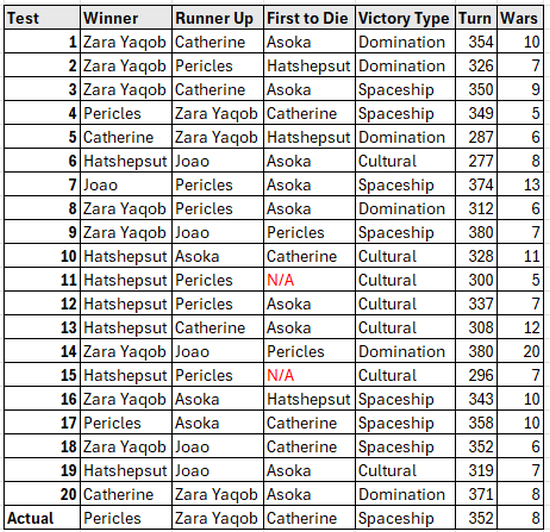
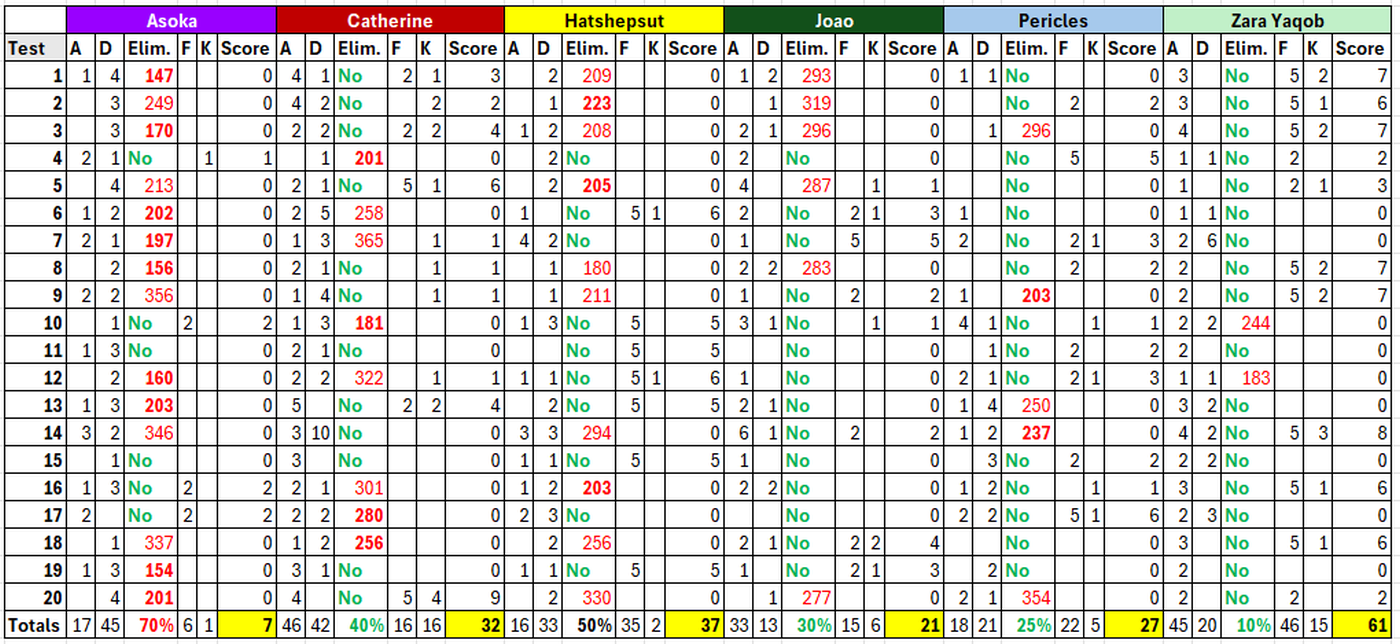
(Note : "A" column tracks the number of war declarations initiated by the AI, "D" the number of times the AI is declared upon, "F" the points for finish ranking, and "K" the number of kills.)
TheOneAndOnlyAtesh: The primary story in this setup was the Battle of East Africa. The game dynamics completely revolved around two leaders, the much maligned inaugural season silver medalist Zara Yaqob and everybody's favorite cursed leader Hatshepsut. These two about equally split 75% of the victories, which was all that mattered in this unique winner-takes-all round, and it took some pretty special situations for a different leader to instead advance. The two fought in most games, and their battles usually determined who won - anything else was merely a sideshow.
A typical Zara game would see Hatshepsut lean too hard into culture at the expense of literally everything else, making it easy for the Ethiopians to smash a sledgehammer into the Egyptian glass cannon. Once he had incorporated the rich and highly developed Egyptian conquests to his empire, the world was his oyster, as he could sit back and coast to space, go and bash some more skulls, or even use the immense culture he got from his Steles and Hatty's cultural prizes to accidentally win by Domination. Conversely, Hatty's best games came when, ironically, she was not trying too hard to win by culture (especially in the early game). Instead, she just played good Civ IV, expanded well while using her War Chariots to ward off the raging barbarians, and made sound teching decisions. Thus, she had a much better foundation to culture away from even if she faced invasions. These games only reinforced my belief that going into culture mode from Turn 0 is really, really bad, sometimes as bad as Turn 0 Archery into Masonry or avoiding The Wheel and Pottery for 50 turns.
The two leaders were pretty evenly matched overall. While Zara more often than not defeated Hatty on the battlefield, he could ill afford not to. On one hand, Zara HAD to kill Hatty by Turn 250 or so in order to win; he failed to advance in every single game Hatty survived. Without that extra territory, he was just as mediocre as the rest of the competition. On the other hand, Hatty could and did win games where her Ethiopian counterpart was also strong, including two games with NO deaths. Obviously, any game where the Ethiopians faltered and the Egyptians did not was effectively an auto-win for Hatty. No game better illustrated this than Game 12, where Hatty played pretty terribly by over-expanding and crashing her econ. However, said over-expansion had utterly crippled Zara, and no matter how bad Hatty was, ruining Zara's game was enough for her to win as the remaining leaders were just that ineffective.
Some games were effectively decided by Turn 75 due to Hatty or Zara establishing domain over this contested region:
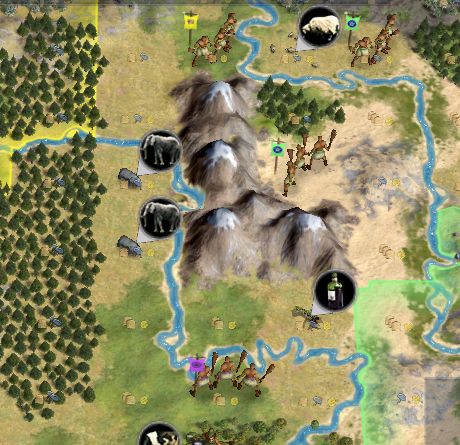
This "Elephant Valley" was crucial for the success of the East African leaders, as it gave them access to the largest river system in the world for easy religious spreads, it blocked off most of the North for future settles, cities there formed good defensive chokepoints, and, most importantly, it was one of the world's few sources of Ivory. Barbarian cities often spawned near this area, an advantage for Hatty if she could utilize her War Chariots in time. In any game, the difference between victory and defeat was that one party had Elephants and the other did not. Hatty especially needed at least one city in the vicinity, and some of her worst games resulted from Zara establishing a complete domain over the Elephant Valley.
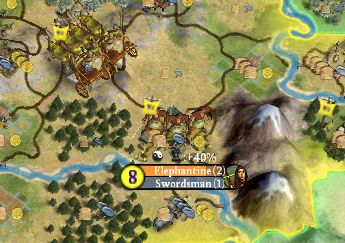
Sorry, I had to. 
Up to this point, I had barely mentioned the other leaders because for all intents and purposes, this match was a duel between Zara and Hatty. Unfortunately, the other four leaders suffered from some combination of the following:
1) An inability to plot at Pleased relations (Joao, Pericles, Asoka but this was less of an issue for him)
2) Hatty ruining their primary win conditions (Pericles, Asoka)
3) Bad or limited land (Joao, Pericles, Asoka)
4) Poor economic skills (Joao, Cathy)
5) Diplomatic problems (Asoka, Cathy to an extent)
In most games, these four either repeatedly fought each other senselessly or did not fight at all, basically doing everything save for stopping the East African Duo until it was too late. With that said, there were three clear pairings that each formed their own tier as far as viability went. Pericles and (surprisingly) Cathy were the two secondary leaders who could plausibly win if Zara and Hatty faltered like in the Actual Game, with the former being the most talented techer and the latter being the best fighter. Meanwhile, Joao and Asoka did not have any realistic chances to make the playoffs except in the craziest of circumstances. The two main reasons Zara or Hatty could fail to win were 1) the two pounding each other into the dust (Games 7, 17), or 2) Zara's successful attack (key word successful) on Hatty coming too late while another leader had a better than usual game (Games 4, 20, plus the Actual Game). The only truly unique game was Cathy's Game 5 romp, where she atypically ran over the entirety of Egypt and used that to steamroll the rest of the map.
The biggest community misconception about this setup was the belief that it was a high peaceweight game. Cathy was not nearly as doomed as thought, surviving the majority of the replays, while Hatty and especially Asoka actually had the most diplomatic trouble. This was a unique peaceweight setup in fact, with half of these leaders - Joao, Zara, and Pericles - being "true neutrals" (PW 6, some degree of warmonger respect, not fanatically religious) who could align with almost anybody. Instead, religious bonds drew the diplomatic lines here. Asoka founded Buddhism in all twenty replays, but after that was anybody's guess. Some games only saw one relevant religion, others saw two competing religions, and more saw four leaders practicing their own faiths. Going into Free Religion frequently shifted the diplomatic landscape as well, either helping leaders resolve historical differences, causing former brothers and sisters in the faith to turn on each other, or turning the secularists into global pariahs if the world was particularly attuned to faith. Sometimes, Asoka or Hatty would found the Polytheism or Monotheism religion immediately after founding their first religion, and this was almost always a blunder that destroyed their games due to the delay in researching critical development and barb defense techs. No matter what, any leader's survival often depended on either being in the majority religion or the religion of the game runaway.
This was not necessarily a world where everybody held hands and sang Kumbaya till the end of time despite this field and the seemingly low number of wars. This did happen, with most games seeing 4-5 leaders survive to the finish, but there were some incredibly bloody games as well, like Game 14 with a staggering TWENTY wars. Sometimes, the religious pariahs were yeeted out of the game while the remaining leaders remained in a religions lovefest, but other times deeply entrenched religious divides could create an endless loop of stalemated wars.
In general, there was no overarching dominant tech leader until well into the Industrial Era, meaning that there was a lot of Castle Era warring between these leaders to further drag down the tech pace. This was often exacerbated by these leaders delaying Rifling research - Willem certainly wishes he had rolled this field rather than the next one. Although these were long games (an average length of 335 Turns, which includes the three outlier pre-T300 finishes) filled with some embarrassingly bad teching from so-called "builder" types, many of them were compelling nail-biters, and the finer details were unpredictable even if the macro stats indicated a static setup. Some gems included Game 20, where Zara won an extremely close space race but Cathy had JUST enough for Domination, or Game 14, which saw three religious world wars between two evenly matched religious blocs breakout. Even the games with no deaths had an intriguing "will someone die" element to it — Asoka only survived Game 11 with one city remaining, for example.
No matter what though, eventually these games would end in either a Hatty Culture win or a Zara Spaceship win. Zara did have a few Domination finishes, but they were effectively from him reaching the end of the tech tree first and then leveraging his above average aggression — the only true Domination wins were Cathy's two upset victories. There were a few close calls on Diplomatic victories, with Hatty nearly getting robbed of two victories in this manner, but I was definitely surprised to not see a single one in this set. I think there were a lot of cultural border tensions and just enough religious differences to help keep relations out of "Friendly" status. Meanwhile, Raging Barbs surprisingly had a relatively low impact on these games save for slowing things down a bit. With all of these leaders being some combination of Creative, religious, and aggressive with expansion, they were able to fogbust the map pretty quickly to shorten the Barbarian Era. There was only one game where the barbarians had an outsized impact, and that was Game 18 when Hatty lost her capital to the barbarians, but ultimately that just created another "Zara game".
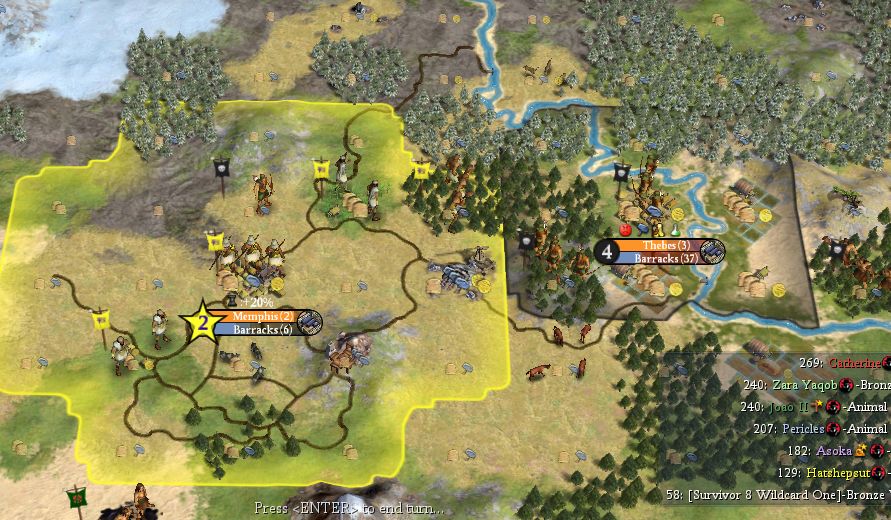
Delving deeper into each leader's performance:

Zara Yaqob of Ethiopia
Wars Declared: 45
Wars Declared Upon: 20
Survival Percentage: 90%
Finishes: 8 Firsts, 3 Seconds (46 points)
Kills: 15
Overall Score: 61 points
Zara had one huge advantage over the rest of the field: he was the only True Neutral who could plot at Pleased, making him the only male leader in this field who actually tried to win these games. Quite a few of the replays saw the Ethiopians be somewhat behind on a victory race (space or Hatty's culture), only to sic a deathstack of Modern Armor onto the game frontrunner and wreck everything. Zara could befriend anybody as long as religious differences were not too much to overcome - Cathy was an especially useful attack dog - but he also had complete freedom to strike whenever he wanted and double his territory in an instant. His already low defensive war count of 20 failed to showcase how secure his diplomatic position really was - nearly half of those invasions came in Games 7 and 17 where Hatty for some reason held some pathological hatred of the Ethiopians, invading them over and over again (Hatty attacked Zara four times in Game 7 alone). Unsurprisingly, other leaders won those games.
The absolute worst thing that could happen for Zara's winning chances was for him and Hatty to become religious allies. Zara gives MASSIVE diplomatic bonuses for shared religion, so if he and Hatty ever ended up religiously aligned, he was essentially as useless as Joao and Pericles, simping on the sidelines as Hatty happily cultured away to victory. This was what hampered him in the Actual Game - by the time he woke up and killed Hatty, he was too far behind a Pericles who had killed Cathy much earlier. Alternatively, he could sometimes lose the expansion race to Hatty, leaving him with too few cities to compete - this happened in the two games he died, both of which were Egyptian victories. I personally think Zara has been quite unlucky in AI Survivor, as he has excellent diplomacy and is a good enough fighter and techer to take advantage. He has just been in some cursed setups. Hopefully he can rehabilitate his reputation, which is still reeling from his dismemberments from the past few seasons.
Best Performance: He had his best solo-kill of Hatty in Game 2 and easily won from there.
Worst Performance: Only settling five cities in Game 12 and eventually getting murdered by Hatty.
Wang Kon Award:
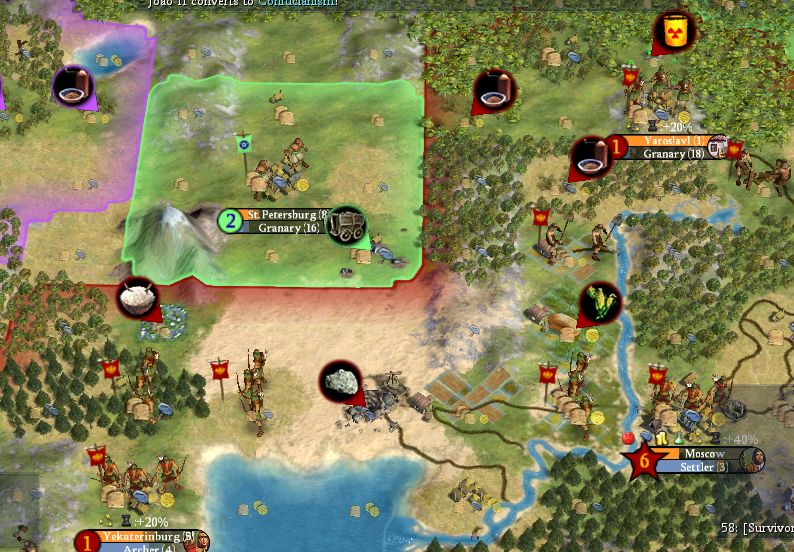
Cathy had lost that city to the barbs.
Bane of the Buddha Award: In both Games 9 and 14, it looked like Asoka was going to win the space race, when Zara swooped in with his larger empire and completely mowed down the Indians to claim victory.

Hatshepsut of Egypt
Wars Declared: 16
Wars Declared Upon: 33
Survival Percentage: 50%
Finishes: 7 Firsts, 0 Seconds (35 points)
Kills: 2
Overall Score: 37 points
This was one of the most Hatshepsut sets of all time, one where Hatty was both a cultural runaway and a mediocre-at-best techer. In fact, both of her pre-Turn 300 wins came WITHOUT THE NEED TO TURN UP THE SLIDER.
Yes, I must emphasize, Hatty won a Turn 277 (!) Cultural victory with the slider at 0% for the entire game. It takes a truly unique set of circumstances to do so — a leader must simultaneously be producing insane gobs of culture while still being rather slow with teching and thus not getting to a point where the leader is comfortable stopping teching to switch up the slider. Indeed, Hatty often sacrificed teching in her dogged pursuit of culture, and she was further slowed down if she faced any invasions, especially from her Ethiopian nemesis.
As I had said in the overview, Hatshepsut's best games actually came when she ignored early culture. For example, her Turn 277 win saw her beeline Archery, Animal Husbandry, and then Pottery before embarking on any cultural pursuits. Conversely, her absolute worst games came when she spent too much of her early game on culture and ended up sacrificing expansion in favor of wonders and missionaries. A major reason for this was that a large tundra region to her North left her quite exposed to the Raging Barbarians. If all she had was Warriors to defend herself with for 50 turns, the results were not pretty. The other common way for Hatty to falter was for her to, for whatever reason, fail to spread her religion to enough leaders to ensure her safety once she cashed in her cultural chips. This sometimes went hand in hand with the first reason, as there were games where Hatty founded the Polytheism and Monotheism religions, only for the rest of the world to adopt the latter when she stuck with the former.
To be frank, I did not come away overly impressed with the Egyptian pharaoh. Her teching was not great, she can get needlessly aggressive at times, and I observed her completely neglect her military despite said aggression, in one case barely progressing in a war despite being two eras ahead in tech. I think a Gandhi, a Ramesses, or a Pericles would have had much better results in her starting position, and she effectively tied with peaceweight outlier Cathy with 3.5 First To Dies apiece. Nevertheless, it is still insane that Hatty has been completely scoreless for eight seasons. It was only befitting of her curse that she completely failed to accomplish anything in the year of the high peaceweights.Best Performance: Easily the Turn 277 win, but her Turn 296 win did see her comeback from temporarily losing a core city to the Ethiopians.
Worst Performance: Game 20, where Hatty tied herself up on an unnecessary early Stonehenge build and had TWO CITIES ON TURN 75. Yes, this was worse than the Game 18 where she lost her capital to the barbs.
When You Are Not Alex Award:
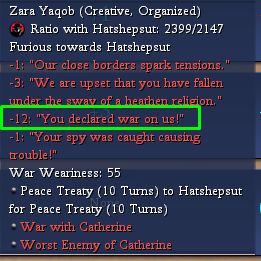
When You Are Not Alex Limited Edition Award:
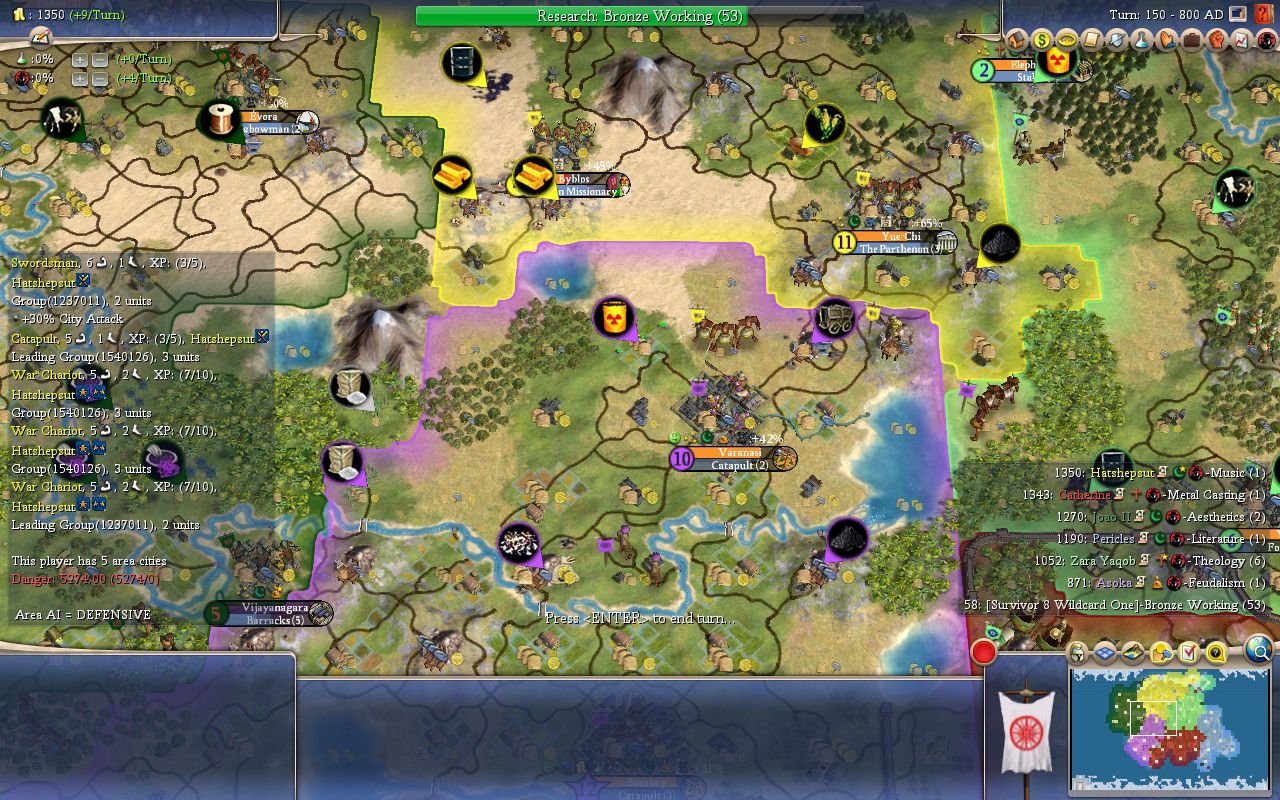
What kind of attack stack is that? 
Taking A Leaf Out Of The Little Red Book Award:
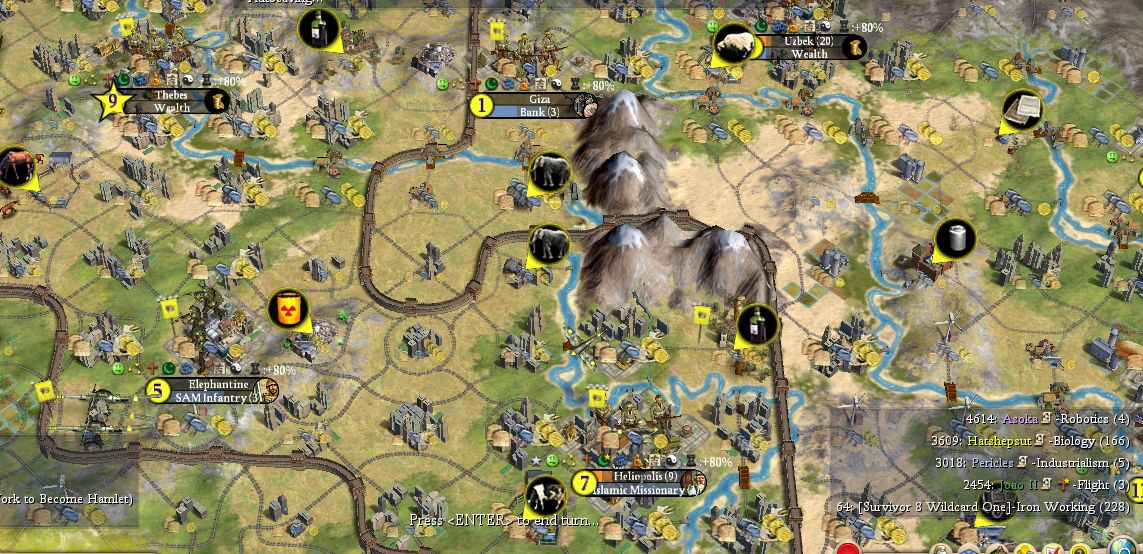
For some reason, Hatty liked to have the slider on after Factories but before the Biology line, leading to some crazy starvation issues when she cashed in her chips. She won this game by the way.

Catherine of Russia
Wars Declared: 46
Wars Declared Upon: 42
Survival Percentage: 60%
Finishes: 2 Firsts, 3 Seconds (16 points)
Kills: 16
Overall Score: 32 points
I have to give major kudos to the Russian leader — she did very well in this set despite her being by far the lowest peaceweight leader here, although that speaks volumes about how underwhelming the rest of the field was. Her defensive war count is deceptively high believe it or not — that number was propped up by the crazy Game 14 where Cathy was attacked a bonkers TEN times and fought a total of 13 wars in that one game. For reference, Joao had that many invasions in this twenty game set. Amazingly, she survived that game AND was in contention to score 2nd place points until Zara, who had been her religious ally the entire game, betrayed her post-Spaceship launch.
However, as I had alluded to, Cathy's diplomatic situation really was not that bad. The three True Neutrals, with their warmonger respect modifiers, could just as easily befriend her as they could Hatty or Asoka, and Cathy's central position gave her good access to any religion, guaranteeing her at least one friend:
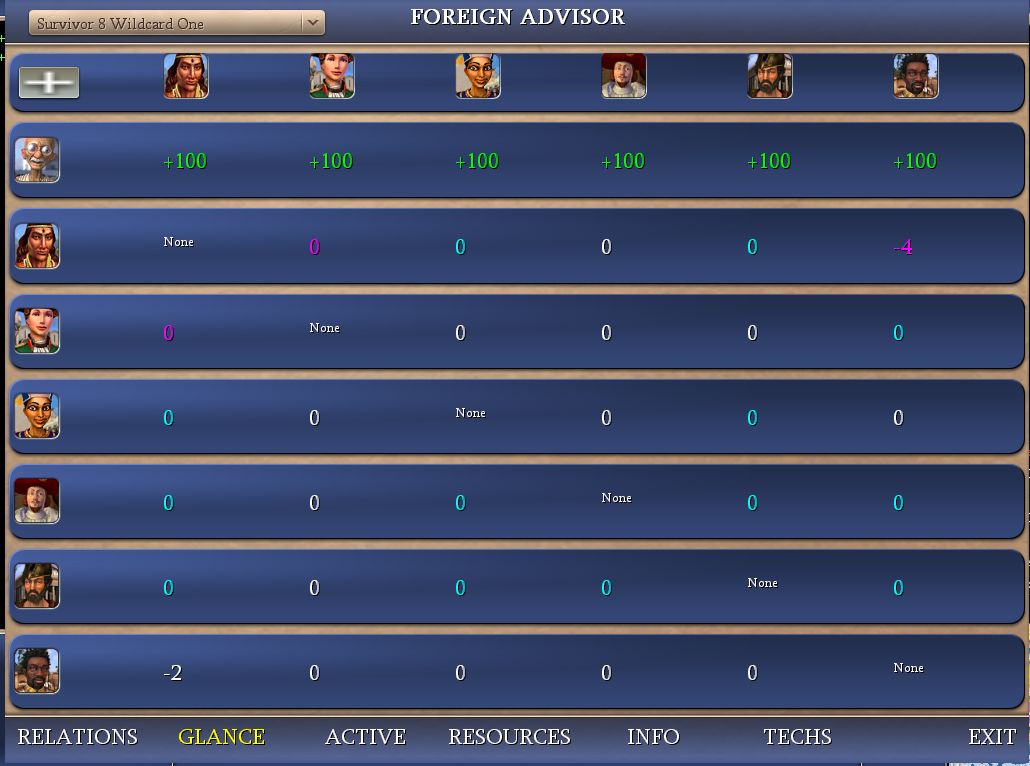
If that friend was Hatty or Pericles, she had a chance at surviving; if it was Joao or Asoka, the two runts, it was less good. Her best possible friend turned out to be Zara, and there were quite a few games, including her two wins, where the pair worked together to take down the rest of the map. Cathy may have seemed like a doomed leader in the livestream, but the actual reason for her getting dogpiled was not peaceweight; it was that she had adopted the pathetically weak Asoka's Buddhism, leaving her a religious pariah.
With that said, this was still an uphill battle for Cathy. While she was by far the best fighter, her econ was... not good. Most games saw her fight and fight and fight and fight and... fight... until she was too far behind to compete for anything - having nearly 90 wars would be high in any field, let alone this one. She also had difficulty choosing the right targets, either attacking Asoka (a poison pill for reasons I will discuss in his section) or Pericles (Phalanxes + strong teching). Put her in Zara's spot and give her good access to Egypt, and I actually think she is one of the dominant AIs here. Usually, some combination of shared religion, civics, and mutual military/"we appreciate the years you have supplied us resources" would ensure her survival, hence her only dying 40% of the time, but there were some hilariously sad bloopers including a game where she was trying to fight Tanks with Medieval units. Like with most warmongers, Cathy needed a relatively early or easy kill in order to have a chance. Nevertheless, she proved here that she is a dangerous foe in almost any setup.
Best Performance: While her Game 5 win was probably the single best performance by any leader in this entire set, I also wanted to highlight her four kill Game 20 performance.
Worst Performance: Getting caught without metals by Asoka of all leaders in Game 4.
Boudicca Award: Having an embarrassingly late Turn 131 Iron Working research in Game 11.
Darius Award: Ruining a promising Game 7 by attacking castle defenses without any siege units, dooming her to irrelevancy and an eventual late death.

Pericles of Greece
Wars Declared: 18
Wars Declared Upon: 21
Survival Percentage: 60%
Finishes: 2 Firsts, 6 Seconds (22 points)
Kills: 5
Overall Score: 27 points
The (very slight) community favorite seemed to have backed this up in the real game, but the replays told a completely different story. Pericles' conundrum was an inverse of Cathy's — while he was by far the most capable techer amongst this ragtag group of leaders, he was stuck in a corner, boxed in by two Creative leaders, and unable to contend for his favored Cultural victory due to Hatty's obsession with culture. Pericles only had room for 5-6 cities, and considering that this is Civ IV not Civ V, that just was not enough to be viable. Most games would see the Greeks either establish some tech lead until he petered out and got outscaled by larger rivals, or fight stalemated wars against technologically backwards but larger foes until it was too late to diffuse the Hatty time bomb.
For Pericles to win, it required that 1) someone kill Hatty, 2) that kill come too late for Zara to snowball, AND 3) Pericles find a way to get some extra cities, usually at the expense of his Russian neighbor. Without 1), Hatty just won no matter what; without 2) and 3), Zara (or rarely Joao or Cathy) would eventually rocket ahead in tech with twice as many production hubs to build Research in. The stars only aligned twice in the replays, and Pericles was very lucky for them to align in the official game. The Greek leader was head and shoulders above his rivals regarding overall competence, but he had neither the space to compete nor the Financial trait to help him make do with the 5-6 cities he had.
Best Performance: His Game 17 win was more "earned" and less lucky than his Game 4 one.
Worst Performance: Launching a really dumb early war in Game 9 that eventually led to his earliest First To Die.
Gandhi Award: Being the true winner of Asoka's crippling of Cathy in Game 4, as this gave him extra space for a few more cities than normal and allowed him to be the tech runaway.

Joao of Portugal
Wars Declared: 33
Wars Declared Upon: 13
Survival Percentage: 70%
Finishes: 1 First, 5 Seconds (15 points)
Kills: 6
Overall Score: 21 points
Joao was one of those "oh yeah he also exists" kind of leaders. The problem with Joao, both here and in general, is that he is the quintessential jack-of-all-trades, master of none leader, lacking any win condition save for the Freddie special of "hope no one attacks me before I win a super late Turn 375 space race" one. Moreover, the Portuguese leader was an odd man out here, being the only leader without the Creative trait or a religious inclination, meaning that he often struggled with border expansion and the encroachment of his rivals. He does have the single best trait combo in the game for rapid expansion, but that did him little good in his little corner that was overly forested and not particularly good once he had chopped it all out (too much plains, not enough commerce).
While Joao rarely had an Observer Civ level economy like in the livestream, his econ was by no means good, and his one win in Game 7 really was the flukiest of flukes where all five of the other leaders had ground each other into dust — note that despite there being 13 wars, not a single one was an invasion of Portugal. Otherwise, Joao did little, what little he did was misdirected (attacking Asoka or Cathy instead of Hatty), and he usually accomplished little, fell behind, lost much of his empire to cultural expansion in the late game, and survived as the little resident fool of the map. As we saw in the Opening Round Alternate Histories, Joao can succeed in certain fields, namely warmonger ones where he can out-expand and out-econ them while they keep fighting, but this was not one of them.
Best Performance: Actually, the only game where Joao really played well enough to win was Game 12, where his spaceship was five turns away from arriving at Alpha Centauri when Hatty's Culture victory triggered.
Worst Performance: Completely failing to capitalize on his neighbor Hatty losing her capital to the barbs in Game 18.
Stalin Award:
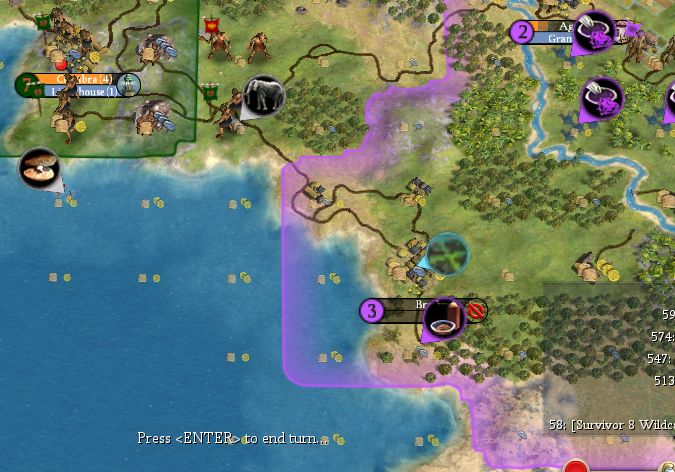
Joao Award: In said Game 18, Joao backstabbed Cathy when she was about to conquer Egypt, but got absolutely nothing from his conquests because they all got culturally crushed by Ethiopia, Greece, and India.

Asoka of India
Wars Declared: 17
Wars Declared Upon: 45
Survival Percentage: 30%
Finishes: 0 Firsts, 3 Seconds (6 points)
Kills: 1
Overall Score: 7 points
Asoka really was not as bad as his low score and total failure to advance suggests, as he was dealt an extremely tough hand in this setup. To start, his land did turn out to be horrible, albeit not necessarily from a raging barbs perspective. They certainly did not help by constantly pillaging his capital grassland gems tile, but the Indian leader would have struggled in a normal game as well with his land.
The real issue with his land was its almost total lack of food resources. At least for the AI (although I think it would be a slow starter for a human as well, even if the land scales well), a grassland Gems resource and an abundance of cottageable tiles could not redeem the complete inability to grow his cities. Although Asoka usually expanded more effectively and handled the barbs better than in the Actual Game, he still had great difficulty growing his cities, like in the livestream. This was an issue for the entire length of the game — Asoka's cities were just smaller than his rivals, so no matter what, there was almost always at least one AI who could outscale him. To add salt to the wound, Asoka's food conundrum also meant that he was more vulnerable than most to the side effects of Factory unhealthiness, both due to the sheer lack of bread and the lack of health resources. Combine this with his low food Mining/Myst starting techs, his Izzy-like pursuit of religions (he sometimes founded the Polytheism religion right after the Meditation one), and his lack of research flavors that guide him towards growth techs, and we get a leader that struggled to launch his empire. Because of his constant slow starts, Asoka was generally unable to spread his religion, rendering him a diplomatic outcast and leading to him both facing the most invasions, even more than Cathy, while also being the clear cut favorite for First To Die.
The Indian leader's true role in these games was as the game troll. Attacking him early was a fool's errand, as he was tough to take down in a 1v1, his land was not well developed, and to take him down required a dogpile which meant relatively little reward. Many games would see leaders expend a massive amount of resources to take down Asoka, only for Hatty or Zara to be too far ahead to be stopped. Making matters worse was the minority religion poison pill — there were quite a few games where Asoka's conqueror adopted the unpopular Buddhism and became the next leader on the chopping block. Befriending him was not much better either, as adopting his unpopular religion was just asking to get yeeted out of the game. Occasionally, Asoka would launch an early pre-Turn 80 copperdec to try and make something of his situation, which only served to instantly ruin both his and his enemy's games.
Otherwise, this was a truly tragic set from Asoka. His good games were a case of "always the bridesmaid, never the bride". He could be in the driver's seat for Alpha Centauri, but Hatty's win condition would be faster. He could take down Cathy, but Zara would have taken down Hatty and have a higher quality 2nd empire. He could tech well, but Pericles' larger cities would help him outscale the Indians. He could not even rely on "hope nobody attacks me" like Joao did. Nevertheless, this set was a good reminder of why Asoka often struggles in AI Survivor — he can do the religion and culture thing, but other leaders are just better at it.
Best Performance: Asoka came quite close to winning some games, including Game 9 (until Zara brute forced his way), Game 14 (like Game 9), and Game 17 (Pericles just edged him out).
Worst Performance: Attacking Joao on Turn 66 in Game 13, accomplishing absolutely nothing, ceding all the territory to his south to Cathy, and eventually becoming First To Die.
When You Are Not Alex Ultra Deluxe Edition Award: Asoka caught Cathy without metals in Game 4, but did a horrific job finishing off the war. For example, when Cathy only had one city left and no metals, it still took Asoka over 50 turns to take that one final city. By that point, he was irrelevant.

This was definitely one of the more unique sets that I ran. The combination of religious randomness, true neutral leaders, and a warmonger to spice things up created some quite interesting dynamics, even if 75% of these games defaulted to two outcomes. While these were at times compelling games, it was clear why most of these leaders seem to always be consigned to Wildcard fodder in these tournaments. Hatty and Cathy proved to be leaders who are elite in one category but so bad in another that they have issues with consistency. The other four leaders proved to be so-so to good in most categories while lacking a true difference maker. Even though this was a thoroughly mediocre group of leaders, they proved to be greater than the sum of their parts as far as entertainment is concerned.
By the way, I think this is one of those games where we need more Alternate Histories to get a true read on this map. Zara and Hatty are effectively tied here at least as far as advancing is concerned, and we may need more replays to see who truly was more likely to move on. I am also curious to see how Cathy would do with more games (maybe she high rolled on peaceweight?) and if there is any plausible way for Asoka to win.



